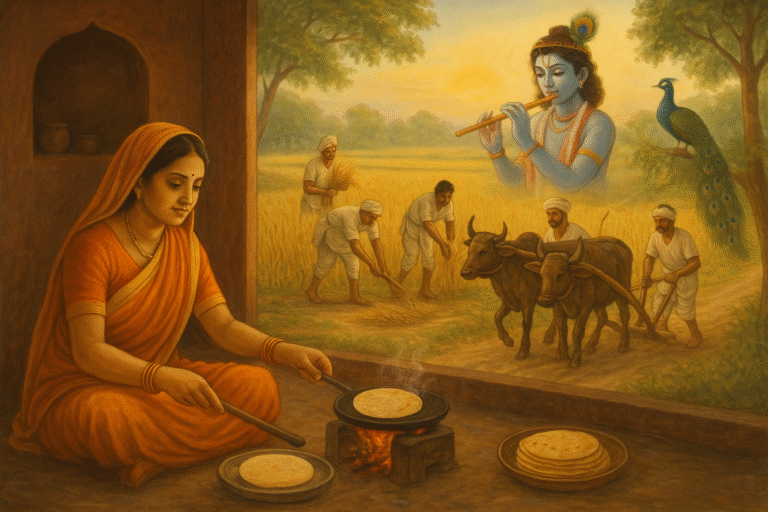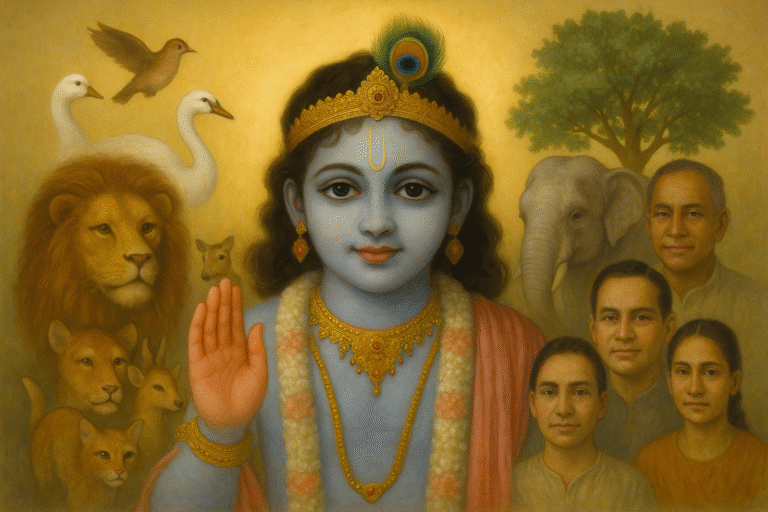🪷 The Four Pillars of Dharma: Foundations of a Righteous Life
🪷 The Four Pillars of Dharma—truthfulness, compassion, austerity, and cleanliness—form the sacred foundation of a righteous life as described in the Srimad Bhagavatam. In a world tilting toward chaos in the age of Kali, these pillars are not just virtues, but lifelines that sustain spiritual progress and social harmony. This blog explores each pillar in depth, offering practical insights for modern living and timeless wisdom rooted in devotion to Krishna.

In the ancient Vedic scriptures, Dharma is described as the natural law that sustains the universe. It’s not just a set of religious duties, but the very essence of living in harmony with oneself, others, and the Supreme Lord. According to the Srimad Bhagavatam, Dharma stands on four legs or pillars, each representing a fundamental virtue:
1. Satya (Truthfulness)
Definition: Speaking the truth, living honestly, and aligning one’s actions with reality.
Modern Relevance: In today’s world of misinformation and deception, truthfulness is a rare treasure. Being honest builds trust in relationships, whether personal or professional. Spiritually, it clears the heart and mind, making it easier to connect with the Absolute Truth—Krishna.
Scriptural Insight: In the age of Kali, falsehood becomes rampant. But when we uphold truth, we protect one leg of dharma.
2. Daya (Compassion)
Definition: Kindness toward all living beings, especially the helpless and the suffering.
Modern Relevance: Compassion is not weakness—it is strength. In a society marked by competition and self-interest, practicing kindness softens the heart and creates a more empathetic world. Compassion in action includes vegetarianism, charity, and forgiveness.
Scriptural Insight: Krishna is known as Bhaktavatsala—one who is affectionate to His devotees. By showing compassion, we reflect His nature.
3. Tapas (Austerity)
Definition: Willingness to accept difficulty for a higher spiritual goal.
Modern Relevance: Whether it’s waking up early to chant, fasting on Ekadashi, or refraining from indulgences, austerity purifies the senses. In a pleasure-driven culture, tapas builds discipline and inner strength.
Scriptural Insight: Lord Rishabhadeva, an incarnation of Krishna, taught that human life is meant for tapasya—to realize the soul’s eternal nature.
4. Shaucham (Cleanliness)
Definition: Purity of body, mind, and surroundings.
Modern Relevance: Cleanliness is often reduced to physical hygiene, but true shaucham also includes mental cleanliness—keeping the mind free from lust, anger, and greed. Clean habits lead to clarity and peace, both essential for spiritual practice.
Scriptural Insight: Cleanliness is the foundation of deity worship and sacred living. Krishna resides where purity is present.
🌑 Decline in Kali-yuga
The Srimad Bhagavatam describes how, in Kali-yuga, these four pillars are gradually destroyed, starting with truthfulness. The other three—compassion, austerity, and cleanliness—are also weakened by modern lifestyles and mindsets.
But there is hope: Chanting the holy names of Krishna, especially the maha-mantra—
Hare Krishna Hare Krishna Krishna Krishna Hare Hare
Hare Rama Hare Rama Rama Rama Hare Hare
—restores dharma in our hearts and in the world.






